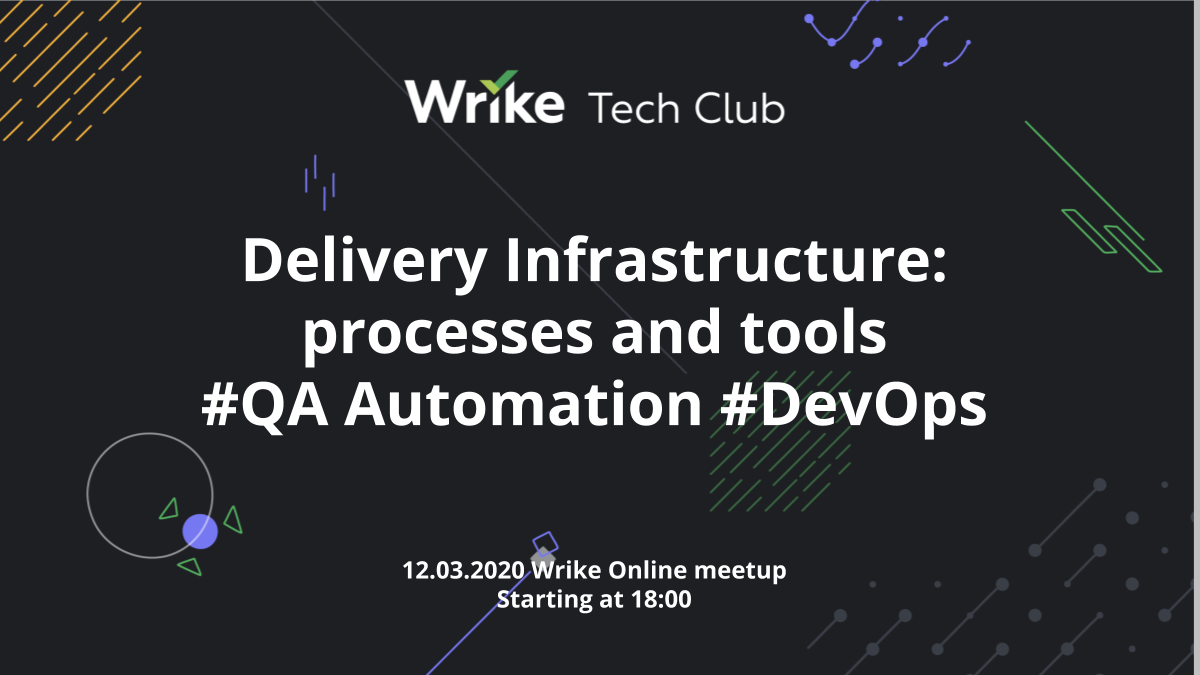Привет, Хабр! Мы в Wrike тестируем новые форматы технических мероприятий и приглашаем всех посмотреть видео нашего первого онлайн-митапа на английском. Поговорили про DevOps инфраструктуру для тестирования веб-приложений, кубы, Selenium и его альтернативы.

История с распространением коронавируса и баны всех массовых офлайн-мероприятий на территории европейских государств внесли свои коррективы, поэтому запланированная Wrike Prague оффлайн встреча тестировщиков и девопов перетекла в ютьюб.
Внимание, доклады на английском языке.
1. Mikhail Levin, Wrike – Selenium — road to Kubernetes
Once upon a time Selenium lived and grew. It was probably the best thing that happened for QA automation in the last two decades, and yeah, that wasn't easy in many ways including infrastructure and stability.
With long experience in selenium grid infrastructure and alternatives, I want to walk you through some issues and limitations of different selenium infrastructures up to our brand new lightweight solution.
2. Vitaliy Markov, Wrike – Callisto: how we learned to stop worrying and love Selenium
Meet Callisto — our lightweight and open-source Kubernetes-native solution for building of Selenium infrastructure. We run 10th thousands of selenium tests in one hour and survive hundreds of daily selenium test runs with it. We want to share our reasons, the solution itself and technical details learned on the way. Our experience might come in handy whether you run that much of selenium tests or you just have some session based work to be run in k8s in many threads.
3. Ivan Krutov, Aerokube – Chrome Developer Tools Protocol: running and scaling in Kubernetes
Many years Selenium is the most popular browser automation tool. However, Selenium protocol still lacks a lot of important features: analyzing and mocking HTTP requests, getting memory consumption and performance metrics, subscribing to application events, retrieving browser security warnings and many more. Fortunately, all this stuff is already supported in the so-called Chrome Developer Tools protocol. There are a lot of talks on how to start using this protocol with client libraries like Puppeteer, but almost nobody tells how to scale this solution. During my talk, I would like to explain how to scale Chrome Developer Tools in Kubernetes cluster and to show some real examples of how you could use this protocol in your tests.

История с распространением коронавируса и баны всех массовых офлайн-мероприятий на территории европейских государств внесли свои коррективы, поэтому запланированная Wrike Prague оффлайн встреча тестировщиков и девопов перетекла в ютьюб.
Внимание, доклады на английском языке.
1. Mikhail Levin, Wrike – Selenium — road to Kubernetes
Once upon a time Selenium lived and grew. It was probably the best thing that happened for QA automation in the last two decades, and yeah, that wasn't easy in many ways including infrastructure and stability.
With long experience in selenium grid infrastructure and alternatives, I want to walk you through some issues and limitations of different selenium infrastructures up to our brand new lightweight solution.
2. Vitaliy Markov, Wrike – Callisto: how we learned to stop worrying and love Selenium
Meet Callisto — our lightweight and open-source Kubernetes-native solution for building of Selenium infrastructure. We run 10th thousands of selenium tests in one hour and survive hundreds of daily selenium test runs with it. We want to share our reasons, the solution itself and technical details learned on the way. Our experience might come in handy whether you run that much of selenium tests or you just have some session based work to be run in k8s in many threads.
3. Ivan Krutov, Aerokube – Chrome Developer Tools Protocol: running and scaling in Kubernetes
Many years Selenium is the most popular browser automation tool. However, Selenium protocol still lacks a lot of important features: analyzing and mocking HTTP requests, getting memory consumption and performance metrics, subscribing to application events, retrieving browser security warnings and many more. Fortunately, all this stuff is already supported in the so-called Chrome Developer Tools protocol. There are a lot of talks on how to start using this protocol with client libraries like Puppeteer, but almost nobody tells how to scale this solution. During my talk, I would like to explain how to scale Chrome Developer Tools in Kubernetes cluster and to show some real examples of how you could use this protocol in your tests.